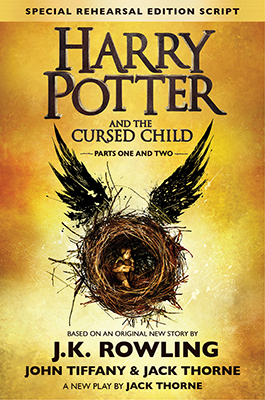Harry Potter and the Cursed Child to Release Accessible Formats

Last month hundreds of thousands of people filled bookstores around the world to get their hands on a copy of Harry Potter and the Cursed Child. Cursed Child is a new play based on the beloved characters of the original Harry Potter series and their children, but set 19 years later. Due partly by the fact that so many fans are not able to travel to the UK to see the play live, the script was published so a wider audience could experience the story. Considering that over 400 million copies of the original series have already been sold worldwide, there has been a tremendous cultural impact on children and adults alike.
With no shortage of copies available, one wouldn’t suspect an issue with getting to enjoy the story. The truth is though, that there is an entire population that has been left out of the excitement and release of Cursed Child. For people with disabilities there are barriers to accessing the media that are often afterthoughts for content creators and publishers.
In my last article I wrote about the Netflix original series, “Daredevil” (www.uw.edu/doit/disability-media-daredevil-and-accessibility-issues) and the lack of captions and audio description available despite the main character having a disability. To continue this trend, I know of no plans at the moment to release an audiobook format of Cursed Child, which may be due to it being in script form. An audiobook would likely feature voice actors, and this could be a conflict with the live version and affect ticket sales.
There has been, however, some exciting news released in July. W. F. Howes, a major publisher of audiobooks in the UK, will be publishing Cursed Child as the first ever dyslexic readers’ edition. This edition is currently for preorder and will feature large print, sans-serif font, thicker paper, and wider margins. I hope this can lead the way for future accessible versions of books, new releases in particular, to include other forms of access to people with disabilities.
As someone who identifies as a nerd and lover of many forms of media, there is something special about being a part of the excitement of something new like a book or a movie. If someone has to wait for an accessible version, they are excluded from that. Watching the Super Bowl live feels better than watching it a week, month, or even years later. Being a spectator can take many forms and is a special experience. It’s the sense of community and inclusiveness that makes our culture a more welcoming place for people with disabilities. We all deserve the right to consume media and have fun, but sometimes groups of people can slip through the cracks.
In addition to Cursed Child, all seven of the previous Harry Potter titles are available from Royal National Institute of Blind People’s (RNIB) Library in braille, large print, and talking book. The talking books (which is read word for word by someone they hired) are provided exclusively to RNIB. This likely means they are only available to those in the UK. Other formats are available for purchase in their online store.
For more information and links to the accessible editions from RNIB, visit www.rnib.org.uk/harry-potter.
For more information on the dyslexic reader’s edition, see www.wfhowes.co.uk/news/announcements/w--f--howes-to-publish-eighth-harry-potter-story-as-first-ever-dyslexic-readers--edition.